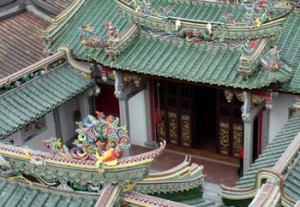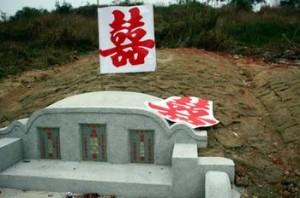
A rooftop temple on top of Meijia Square housing complex in Shenzhen’s Nanshan District has become the latest in a series of controversial rooftop structures in China.
The report comes after a privately owned Beijing rooftop villa made from artificial rocks came to public attention last week. Authorities have since given the Beijing owner 15 days to demolish it, or face punishment. Local residents said they feared it might have caused the entire 26-storey apartment block to collapse in on itself.
Carl Ji, a Shenzhen resident, told The Nanfang today: “This kind of construction work is illegal. Shenzhen’s government should demolish it as soon as possible to set an example. Who is this guy that he thinks he can build his own temple on a public area? He’s just interested in his own private interests. It is arrogant.”
The 21st storey apartment on which the Shenzhen temple has been built is said to be worth 15 million yuan (US$2.5 million). The building’s tenants are all “either high-ranking officials or very rich people,” according to the report by Yangcheng Evening News today.
“The Meijia Square housing complex is an expensive property where every square metre is valued at about 30,000 yuan (HK$38,000),” the South China Morning Post also said in a follow-up report earlier today.
The Post added: “Neighbours were unsure who the owner of the property was, but said that the temple was often occupied and used for traditional Chinese religious practices… neighbours did say that golden sheets of joss paper… occasionally floated down from the temple’s perch.”
The temple, suspected to be an illegal structure, first came to public attention Monday after Shenzhen Special Zone Daily seized on the controversial local oddity in the wake of the Beijing story.
Particular concerns with the Shenzhen temple, aside from structural issues, are regarding restricted access to the rooftop, which is a public area designated as an emergency escape route — though how residents are supposed to “escape” from a rooftop in the case of a fire, for example, is perhaps a question in itself.
“A police spokesperson said the department would demolish the structure if illegal construction was confirmed, and measures such as the freezing of property rights would be taken if the owner opposed the demolition,” Shenzhen Daily reported earlier this week.
A fingerprint scanner built into the roof’s gate is apparently intended to keep away unwanted visitors.
The case is still under investigation by local authorities.

Photo credit: Shenzhen News














